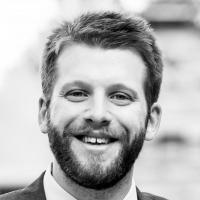A Bolt From the Blue, Part 2/6
This is one of a series of six posts covering my lip injury and surgery. Here’s Part I.
Even with a fresh lip injury, a month off the horn seemed impossible. Before the injury, playing the trumpet, thinking about playing the trumpet and listening to other people play the trumpet used so much of my time and energy that I scarcely knew what to do with myself when I decided to put the horn in its case for four weeks. With little else to do besides drink coffee and twiddle my thumbs, I started learning guitar and reading a lot, starting with the scant literature on chop injuries. I began with Lucinda Lewis' two excellent books on the subject, Broken Embouchures and Embouchure Rehabilitation. I started heavily researching lip injuries in brass players, and I found several trumpet players who’d experienced similar injuries. I pestered everyone I could into talking to me on the phone and tried to gather as much information as I could.
I also got really into personal development, starting with a book recommended to me by jazz trumpeter Ingrid Jensen in 2008: Psycho-Cybernetics. The book’s main point is that human beings will always think and act in accordance with what they believe to be true about themselves and their environment (in fact, I think that may be a direct quote). In other words, your beliefs (accurate or not) govern your actions, as we all know, but here’s the thing: you can change your beliefs. Consciously. On purpose. Psycho-Cybernetics helped me realize that my self-image (along with my thoughts and beliefs regarding the trumpet and my injury) would largely determine how my recovery went, and I set about to gain control of those factors. This is starting to sound like a plug, I know, but this book changed forever the way I view the world, and I’m convinced that had I not picked it up when I did, I would not be playing the trumpet today.
At the end of the four weeks, I picked up the trumpet again. I immediately realized that nothing seemed to have healed in my damaged lip. It still felt thin, loose, weak and slightly lumpy, but now I had to contend with a month of muscle atrophy. I began playing a few minutes at a time, contending with strange tingling sensations known as neuralgias. Though my chops usually felt pretty awful, I really didn’t sound too bad. A couple weeks later, I was gigging again. Yes, a couple of weeks after picking up the horn following a major injury. Doesn’t that sound completely insane? It didn’t sound insane to me at the time, though, as I was champing at the bit and ready to put this bad dream behind me for good.
I made slow but somewhat steady progress, gradually building my endurance. I was pleasantly surprised at how . . . normal I sounded (though my lips often felt like hamburger meat), but one night in early August, during a rehearsal, the injury recurred. My chops were exhausted, and I remember my top lip collapsing the same way it did the first time. Pop. My lip felt slack, and the next day I could barely play. After a few days, however, the lip felt a little stronger, and in a couple of weeks was pretty much back to normal, or at least my new version of normal. Though I didn’t yet know it, this would my life for the next year: a few weeks of normalcy on the horn, followed by an “embouchure collapse” and about two weeks of gradually strengthening the muscle. I began to live in constant unconscious fear of my chops giving out on me at any moment. Not fun.
After a third embouchure collapse on Oct. 2, almost five months after the first one, I realized I needed to see a specialist about the situation. Deciding whom to see was easy, as there was one name that towered above the rest in my research: Dr. Simon McGrail, a renowned facial surgeon in Toronto and a leading medical expert regarding lip injuries in brass players. I had spoken with him on the phone back in May (after my very first injury), and he had urged me to come see him right away. I had decided to see if a month of rest would take care of things, but having tried that unsuccessfully, I was ready to get this figured out once and for all. I made an appointment for Nov. 15, and fearing the worst, booked airfare to Toronto.
